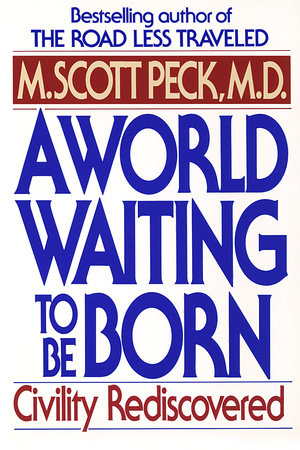If organisational behaviour relates itself to the study of how human beings behave in an organisation, as individuals, or in groups, not to speak of how organisations themselves behave, it goes without saying that we are all organisational creatures, born not only into a society and culture, but also into a specific/complex organisation. Call it family, marriage, schools, businesses, or what you may.
Yes, we all seem to know too that we live in society, a society of contrasts and a society that has almost forgotten the glory of what it means to be human. And, this is where there’s something seriously wrong, not so much with our culture, where values have changed, but with us too.
So, what’s the remedy? “We are in need of healing.”
The Genesis
The Road Less Traveled by Morgan Scott Peck, MD — first published 45 years ago — evolves on the genesis of it all. It does not stop there. Dr Peck’s other brilliant book, A World Waiting to Be Born — the basis of this critique — also has all the essentialities of the former — and, extraordinary in every sense too. It remained on The New York Times bestseller list for many years.
The question, of course, is not whether A World… would be able to emulate The Road… example, in word and deed, or every sense of its sustained exceptionality. Even if it doesn’t, in terms of history, the good doc’s seminal volume is bound to arouse, and stimulate our brain cells, and also rally an entirely new generation — to think deeply, and inspire.
A man with a vision of his own and heightened consciousness, Peck, in the expanse of his fascinating book, in question, explores and gives us powerful new reasons for both hope and confidence. In so doing, he offers a bold prescription for our deeply ailing society. “Our illness,” Peck implores “is incivility:” an imposing amalgam of morally destructive patterns of self-absorption, callousness, manipulativeness and materialism, which are so well entrenched in our routine behaviour, that we don’t even recognise them. Or, even if we do, we’re always trying to keep our powder dry and ignoring them with ‘seasoned’ contempt.
Peck dissects several clichés, through his work, with the precision of a surgeon at the operating table. Is there something that is seriously wrong with our personal and organisational life? But, unlike armchair critics, or experts, Peck uses examples from his own life, case histories and dramatic scenarios that all made a ‘conscious’ decision to bring civility to organisations. What’s more, the author also shows us how change can be effected and organisations restored to health.
The Tightrope
While walking on the tightrope of marriage and separation, ethics and submission, and of selves and systems, including the ambiguity of pain and disease, and the need to achieve, Peck offers his ‘solutions’ with gusto; yet, he tells us that there’s no panacea, or quick-fix, unless and until we try our best to drive away the ‘devil’ within, and embark on a voyage of [re]discovering ourselves: of revisiting our own Utopias. Besides this, the evolution of a paradise also applies equally well, in Peck’s view, to organisations; organisations that are in the world, but not in the world.
Not only that. The author’s signature tune to the essence of ‘greatness,’ and the spirit of one’s own burden in a competitive world, is only too relevant: “All of us are actors in a marvellous, complex, cosmic drama.” Understandably so, because, Peck’s writing sensibilities provide the saga of Sigmund Freud as a case example.
As Peck paraphrases: “I do not know you. If you have a sense of destiny, I cannot certify that sense, [or] sights unseen, to be perfectly sane. And, even if I meet you, it is unlikely I could prophesise — no matter how sane you are — that you will, in fact, do the great things you feel you ought to be doing.”
A World… is eminently readable, no matter the number of times you read, or re-read, it. It’s, in its essence, a perfect ‘Peck’ at simple, incisive logic. A new ideology of pure delight — one that all of us would do well to follow, every day.

